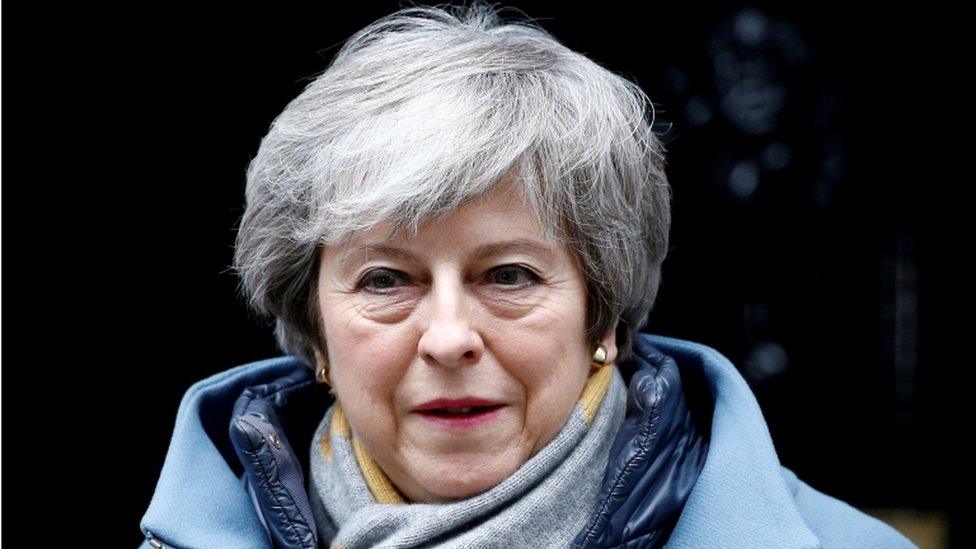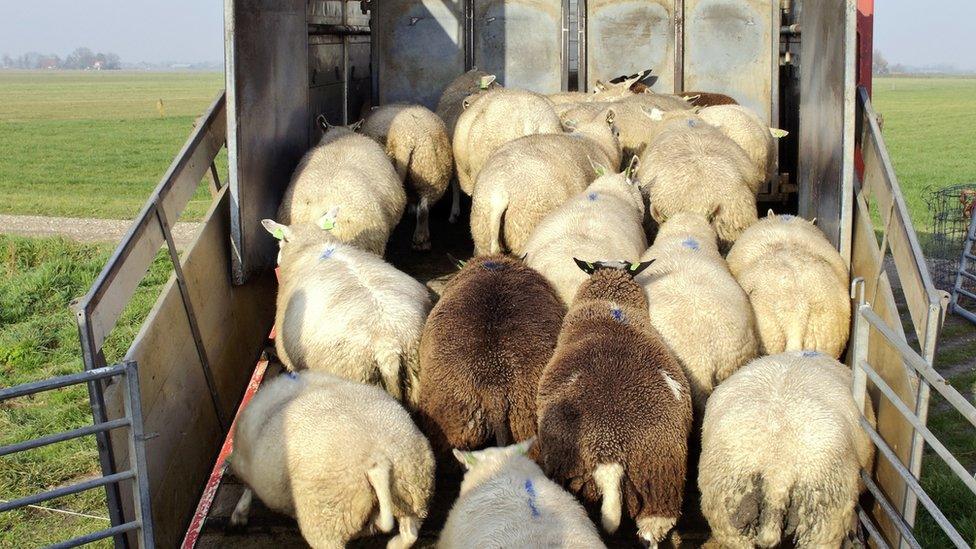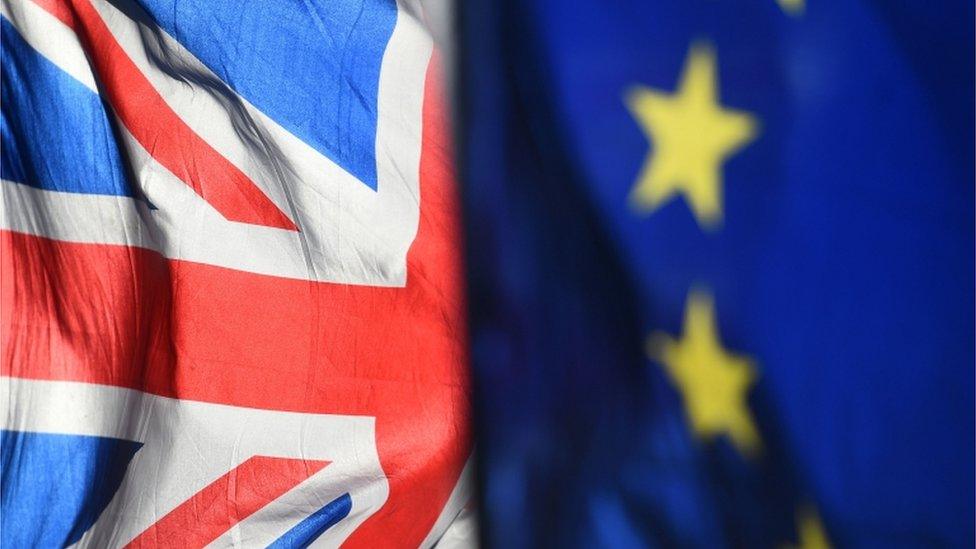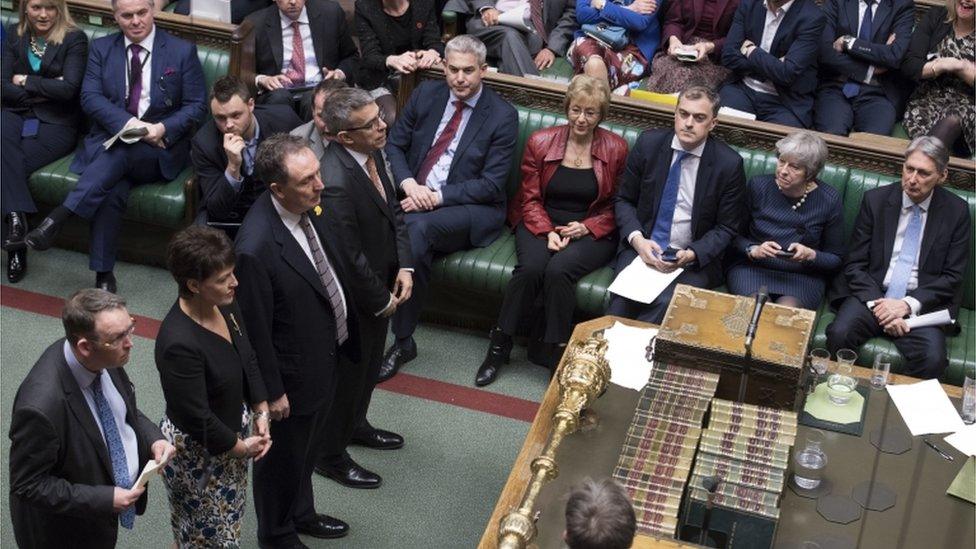Brexit: trading insults
- Published
The UK government set out its proposed tariffs if there is a 'no deal' Brexit. Even if they aren't applied, they may indicate where negotiations will go after the Withdrawal Agreement phase.
This united the Irish, Northern Irish and UK business lobbies in fury at the consequences and lack of consultation, though some farming interests can feel relieved.
Some EU imports - notably of cars and meat - would become more expensive, and foreign buyers of some UK exports would face price hikes, requiring a sharp shift in the business model of these sectors in the UK.
The next phase of negotiations could be cruel in exposing both the paucity of options facing the UK and the inexperience of Britain's trade negotiators. And even more complex than goods trade is the more important services sector.

We may be close to the end of the beginning of Brexit. Or maybe the torture will continue, before the second act of the drama can begin.
It remains difficult to predict, except to say: next comes the tricky bit. Sounds familiar?
Amid the meaningful votes of recent days - the ones that turned out to have a different meaning in translation - we got an insight into the trading posture the UK Government intends to take.
This came in the long-awaited announcement on tariffs if there's no deal on Brexit. No doubt this was partly to alarm Tory and DUP MPs into backing the Prime Minister's deal. The intention is not to introduce the tariffs, but to be willing to do so in the event of no deal, at least for 12 months.
However, it also forced ministers into making choices on the direction of travel for tariffs, and indicating some of the dilemmas yet to be faced.
There were two big elements. One was to say that the international boundary in Ireland is to allow goods trade without barriers. The only checks, though not at the border, would be for some animal and food exports. That requires a sort of honesty box for those shifting goods across the EU frontier.
The other is to cut tariffs on most incoming goods to zero. That much appeals to the free marketeers among Brexiteers. More pragmatically, it is intended to avoid a surge in inflation due to tariffs adding to importers' costs. (That's not to say there won't be a boost to price inflation if the pound slumps against other currencies.)
Meat the neighbours
But there are significant exceptions, spread over hundreds of product lines as defined by international trade conventions. Agriculture is one, for beef, sheep, poultry, pork and some dairy products.
Those wishing to import these into the UK will continue to pay some punishingly high tariffs for goods coming from outside the EU, and start to do so for EU imports. The rules of the World Trade Organisation state that, in the absence of a free trade deal (which it must approve), such import tariffs must be the same for all WTO members.
Special measures for meat trade reflect the fortress that the European Union has built around agriculture, to protect its farmers.
They would ensure farmers continue to be protected from an influx of much lower-cost, more efficiently produced meat from outside Europe.
But it means such products being imported from the European Union would become much more expensive. And we can anticipate that the EU would impose the same barriers to UK exports into the EU.
For lamb farmers, who have been selling a third of their output to the EU27, that represents a very significant blow. We could expect a glut in the UK market, and much lower domestic prices for British lamb, on a product which is barely profitable at the best of times.

For Irish farmers who depend on beef, butter and cheese sales to the UK, the new tariffs would be a very substantial barrier to trade.
There's fury in Ireland that this has been so insensitively handled. The EU commissioner from Ireland, Phil Hogan, who covers the agriculture brief, was quick to say that the UK proposals would likely break WTO rules.
There's also astonishment in Northern Ireland. After all the time spent ensuring the province is fully aligned with the UK market, the proposed tariff regime could have the opposite outcome.
While the free flow of goods on the border would look like "a smuggler's charter", checks on agricultural goods would have to be introduced on the Irish Sea.
A spokesman for Northern Ireland's manufacturers compares it to leaving Northern Irish firms with "one door being shut in our face and one door being thrown open to allow the world in to punch us in the face".
That response may suit Downing Street. It's another reason for the Democratic Unionists to relent in their opposition to Theresa May's Brexit deal: "If you don't like a potential managed customs border at Belfast docks, then have a look at the barely managed one that's the alternative."
Le No Deal
Falling back on WTO rules, as hardline Brexiteers want to do, make the organisation the police authority for the UK's tariff regime. (Let's leave to one side, for now, that the organisation itself is in crisis, because the US refuses to allow appointment of members of its court, which adjudicates disputes.)
Its most important and relevant rule for a no deal Brexit - without a trade deal, the same tariff for all - hits the car and truck market as well.
By continuing a tariff of 10% on a car coming in from Japan, Korea or the USA, the UK has said it would have to apply the same level of tariff on imported cars from the European Union.
Of course, that helps protect the UK car-making industry, which is a major employer. It is further helped by the proposed exemption from tariffs of car parts, which cross the North Sea and English Channel in both directions and in vast quantities.
However, for the British car buyer, it pushes up the price of many familiar imported marques. For a £15,000 Renault, it's £1500 more. For a £40,000 BMW, it's £4000.
So, you might ask, British-made cars would become more attractive on price comparison? At first, yes, but there's then going to be an incentive for UK manufacturers to put up their prices and boost profits. Then in the long term, protected from foreign competition, they lose efficiency and competitiveness.
HM Revenue and Customs published, with the proposed tariff schedules, an analysis of where the costs may lie, external. It didn't apply actual numbers, saying that would come after a 'no deal' Brexit, if that takes place.

But it was a chilling set of warnings as to the disruption that these changes would bring about. In car and truck-making, it said UK manufacturers could expect to lose big European markets, and would have to replace them with British customers:
"The automotive vehicles sector is highly export intensive and this will negatively affect UK exports. Retaining UK tariffs will help put this strategically important sector in a better position in the domestic market."
That doesn't happen overnight.
Among the gaps it highlighted was an analysis of the impact on the nations and regions of the UK:
"Regional impacts are likely to depend on each region's dependence on the goods sectors and in turn their dependence on imports," observed HMRC.
"Regions least dependent on imported goods for production purposes, such as London, are likely to be less impacted by this policy whereas other areas more dependent on imported goods, e.g. North East of England, could be more impacted."
Consternation nation
So the UK government will or would put protections in place for farmers, because the fortress walls are already high and their removal would be harshly disruptive. Also, the car industry, because it's so big and important.
You can see from the others on the list of products exempted from zero rated tariffs where UK government has clocked there are sectoral interests to protect against dumping or swamping by cheap goods currently kept at bay be EU tariffs.
UK manufacturers of some textiles, fibre glass, fertiliser, ceramic tableware and plastic toilet brushes can breathe a sigh of relief. The fishing industry is protected against cheap frozen imports.
But if you take ceramics, only six out of 50 tariff lines have been included. There's no explanation why they have been chosen. There is no context given of what the price might be in terms of industry, jobs or inflation, nor any environmental or equalities assessment, which is normal with such a policy.

There has been next to no consultation on this list, causing consternation with the big business lobby groups.
They are concerned that some industries that appear to have been protected may not be when WTO rules are applied. Continuing EU measures to counter Donald Trump's tariffs on steel and aluminium could be ruled out, because the UK has not taken the time or effort to make its own, separate, legal case against the impact of the USA's measures.
Likewise, there are measures to protect selected developing countries, which have historic links and which have long had preferential access to UK and EU markets for products such as bananas. Will the UK be allowed to roll these over, without making the case again?
Therefore, many other industries may feel exposed by their absence from that list, only now realising that they face imports at much lower prices, or without the EU quota constraints that can have a similar effect to tariffs.
Inexperience
One sector that ought to be rubbing its hands with glee at all this is the lobbying industry. With so much flux and uncertainty in the next round of negotiations, there is all to play for in influencing UK trade negotiators in setting their priorities.
Whitehall has been able to divert much of this pressure for nearly half a century, by pointing it towards Brussels.
Britain's trade team has had to expand rapidly from around 50 to 500, according to those watching it closely. They note, also, that it is largely comprised of bright young things with little to no experience of either trade or negotiating.

And even if you are bright enough to understand the complexities of trade policy, becoming expert in negotiating is a different set of skills. Even New Zealand has more experience in this than the UK. That's where Britain has gone to recruit its chief negotiator.
The Withdrawal Agreement phase has made British negotiating skills look woefully inadequate, not least in failing to understand the interests and anticipate the strategy of those on the other side of the table.
Theresa May's team has been up against a team of tough negotiators from the Commission, maintaining a disciplined, unified approach from of countries, determined to stay united and also to keep options open for the UK to back down from its red lines, or from Brexit itself.
But once the withdrawal has taken place, there is no such incentive. Seasoned trade negotiators in Brussels know their advantages and they can see the UK's weaknesses. They know the inexperienced UK side is under pressure of overhyped expectation, battling on several fronts to deliver multiple trade deals quickly.
Language barrier
The US has set out its agriculture demands for any future trade deal, in terms of the UK fitting with its standards and regulations. Chlorine-washed chicken is only the start of it. Many such practices are incompatible with EU rules.
The UK is indeed "taking back control" - not so much to make the rules and regulations for its own economy, but enough control to decide which foreign power's rules to take.
And this is not just about goods. The service sector takes up more than three-quarters of the economy. Trade in services can be more complex. And it's particularly important to the UK economy, in finance, business services such as accountancy and consultancy, and in digital commerce.
Obstacles to trade in services are not in tariffs or quotas, but in non-tariff barriers. These can be in licensing, qualifications of professionals, required domestic presence or content, data handling rules or, informally, in language and business culture.
The European single market has been about breaking these down. It's far from having achieved that in services.
But so far as it has been successful, it will soon have plenty opportunity to use these non-tariff barriers to keep Britain out, to put the UK at a disadvantage, or simply to dictate what rules Britain will have to accept.